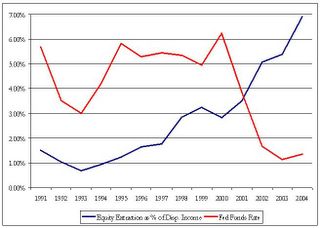Monday, September 26, 2005
Credit Card Minimum Increasing in Oct.
From SanDiegoReader.com
Next month, people who have held a credit card for some time should get a surprise: each month, they will have to pay 4 percent of the outstanding balance on the card, not 2 percent. This move was dictated by the federal government's comptroller of the currency in 2003. The phase-in for new customers began in the summer, and October is the big month for existing customers. It's not small change. Almost 40 percent of credit-card holders pay only the minimum balance, according to Cardweb.com.
The average household credit-card balance is around $9000, according to Boston's Babson Capital. Previously, families paid a minimum of $180 a month. Now, they will have to pay $360 each month.
With gas at $3.00 per gallon and the credit card minimum increasing in October, Christmas could be a very interesting time for the consumer this year. Look for increased refinancings and home equity extraction next month as consumers tap their home ATMs to compensate.
Greenspan's Bubble Research
Greenspan appears to be so concerned about the potential economic impact of the housing bubble that he published a research report titled Estimates of Home Mortgage Originations, Repayments, and Debt On One-to-Four-Family Residences about the most nefarious result of the bubble, equity extraction. This is significant because the paper (a collaboration with James Kennedy) marks only the 2nd time in his career as Fed Chairmen Greenspan has published any of his research (the 1st was in 1997 and was on the Auto Industry). Most economists have felt that equity extraction has been driving consumer spending in America, which is driving about 70% of GDP. Now Greenspan has provided the research that proves it. Of course, the Fed has no one to blame but themselves for this Equity Extraction bubble, as the graph shows (and we all know intuitively) that Equity Extraction is inversely correlated with the Fed Funds rate. It is scary to think what may happen to the economy if the Equity Extraction does slow.

Subscribe to:
Comments (Atom)